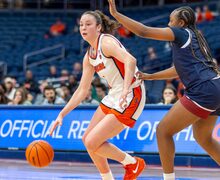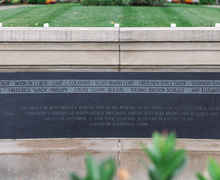Why did the NCAA give Syracuse basketball 4 scholarships back?
Daily Orange File Photo
Syracuse gained back one scholarship for the next four seasons, which softened the harshest penalty the NCAA inflicted on SU last March.
When the NCAA issued its penalties against Syracuse last March, the loss of 12 scholarships across four seasons was the biggest hit to the Orange.
On Wednesday, when the NCAA released its decision on Syracuse’s appeals of three different penalties, the scholarship reductions were softened to eight across four seasons. The NCAA gave the Orange one scholarship back for the 2015-16, 2016-17, 2017-18 and 2018-19 seasons. The hearing Infraction Appeals Committee detailed its reasoning for this in a nine-page report, and the summary of the decision is below.
What did Syracuse argue?
Syracuse’s oral argument against the scholarship reductions had four tiers, according to the NCAA report. They were that that the “penalty is disproportionate to the specific context of the case,” that the “penalty is inconsistent with prior infractions cases,” that “the hearing panel failed to explain why it was appropriate to deviate from precedent” and that, as a result, “the hearing panel abusing its discretion” with the penalty.
What was the NCAA Committee on Infractions’ rebuttal?
The Committee on Infractions argued that each case has its own specific facts, which was in response to Syracuse citing precedent in its appeal. The committee also said that the scholarship reductions were appropriate given Syracuse’s infractions and equal to, and in some cases lower than, scholarship reductions in other rulings.
What did the NCAA appeals committee decide?
In its report released Wednesday, the appeals committee wrote that the effect of precedent was “central to the resolution of whether the hearing panel abused its discretion.” The committee appealed the past cases presented by the Committee on Infractions, and decided that the scholarship reduction was a “departure from precedent.”
The appeals report cited a University of Michigan case from 2003, described by the Committee on Infractions as “one of the most serious ever to come before the committee,” in which scholarship reductions were spread across four years and reduced by four total scholarships. The report also cites a Texas Tech case from 1998, in which with the men’s basketball program lost seven scholarships over seven years (an average of 2.5 year). That was the highest number of scholarship reductions, and Texas Tech’s infractions included eligibility certification, extra benefits, recruiting, unethical conduct, failure to monitor and lack of institutional control.
The Infraction Appeals Committee said that the Committee on Infractions should not be strictly bound to precedent when all situations are different. But it also said that past precedent should be used as a guideline for decisions, and didn’t feel that there was enough of a difference in Syracuse’s case to warrant a deviation from the Michigan and Texas Tech cases.
In conclusion, the appeals committee felt that the hearing panel “failed to consider and weigh material factors and therefore, abused its discretion in the imposition” of the scholarship reductions.
For Syracuse, that is very good news.
Published on November 25, 2015 at 2:22 pm
Contact Jesse: jcdoug01@syr.edu | @dougherty_jesse
Related Stories
- What we know: A breakdown of Syracuse's NCAA appeal results
- See how far Jim Boeheim fell on the all-time coaching wins list
- Syracuse University statement on NCAA infractions appeal decision
- Syracuse wins back 1 scholarship for each of next 4 years in NCAA appeal
- Read the full NCAA Infractions Appeals Committee report





